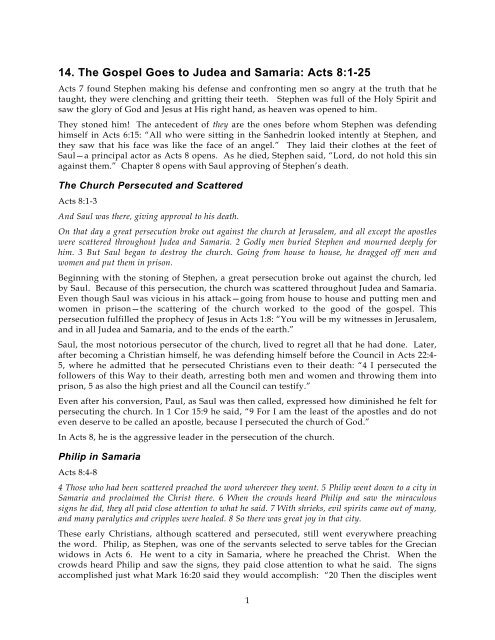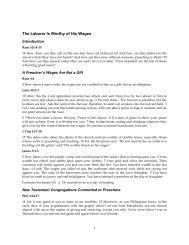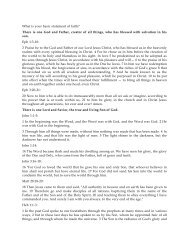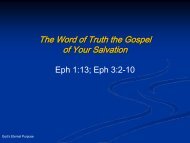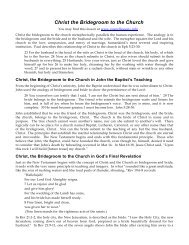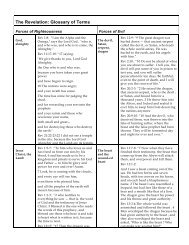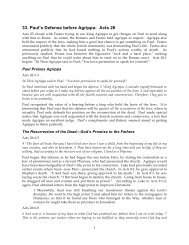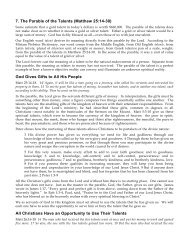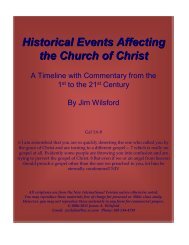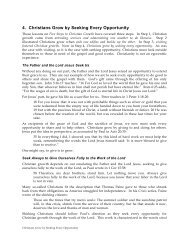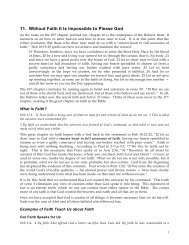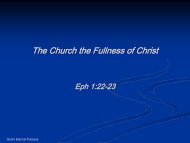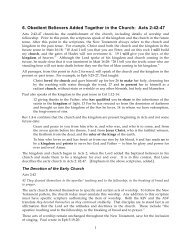Acts 8:1-25 - Gospel Lessons
Acts 8:1-25 - Gospel Lessons
Acts 8:1-25 - Gospel Lessons
Create successful ePaper yourself
Turn your PDF publications into a flip-book with our unique Google optimized e-Paper software.
14. The <strong>Gospel</strong> Goes to Judea and Samaria: <strong>Acts</strong> 8:1-<strong>25</strong><br />
<strong>Acts</strong> 7 found Stephen making his defense and confronting men so angry at the truth that he<br />
taught, they were clenching and gritting their teeth. Stephen was full of the Holy Spirit and<br />
saw the glory of God and Jesus at His right hand, as heaven was opened to him.<br />
They stoned him! The antecedent of they are the ones before whom Stephen was defending<br />
himself in <strong>Acts</strong> 6:15: “All who were sitting in the Sanhedrin looked intently at Stephen, and<br />
they saw that his face was like the face of an angel.” They laid their clothes at the feet of<br />
Saul—a principal actor as <strong>Acts</strong> 8 opens. As he died, Stephen said, “Lord, do not hold this sin<br />
against them.” Chapter 8 opens with Saul approving of Stephen’s death.<br />
The Church Persecuted and Scattered<br />
<strong>Acts</strong> 8:1-3<br />
And Saul was there, giving approval to his death.<br />
On that day a great persecution broke out against the church at Jerusalem, and all except the apostles<br />
were scattered throughout Judea and Samaria. 2 Godly men buried Stephen and mourned deeply for<br />
him. 3 But Saul began to destroy the church. Going from house to house, he dragged off men and<br />
women and put them in prison.<br />
Beginning with the stoning of Stephen, a great persecution broke out against the church, led<br />
by Saul. Because of this persecution, the church was scattered throughout Judea and Samaria.<br />
Even though Saul was vicious in his attack—going from house to house and putting men and<br />
women in prison—the scattering of the church worked to the good of the gospel. This<br />
persecution fulfilled the prophecy of Jesus in <strong>Acts</strong> 1:8: “You will be my witnesses in Jerusalem,<br />
and in all Judea and Samaria, and to the ends of the earth.”<br />
Saul, the most notorious persecutor of the church, lived to regret all that he had done. Later,<br />
after becoming a Christian himself, he was defending himself before the Council in <strong>Acts</strong> 22:4-<br />
5, where he admitted that he persecuted Christians even to their death: “4 I persecuted the<br />
followers of this Way to their death, arresting both men and women and throwing them into<br />
prison, 5 as also the high priest and all the Council can testify.”<br />
Even after his conversion, Paul, as Saul was then called, expressed how diminished he felt for<br />
persecuting the church. In 1 Cor 15:9 he said, “9 For I am the least of the apostles and do not<br />
even deserve to be called an apostle, because I persecuted the church of God.”<br />
In <strong>Acts</strong> 8, he is the aggressive leader in the persecution of the church.<br />
Philip in Samaria<br />
<strong>Acts</strong> 8:4-8<br />
4 Those who had been scattered preached the word wherever they went. 5 Philip went down to a city in<br />
Samaria and proclaimed the Christ there. 6 When the crowds heard Philip and saw the miraculous<br />
signs he did, they all paid close attention to what he said. 7 With shrieks, evil spirits came out of many,<br />
and many paralytics and cripples were healed. 8 So there was great joy in that city.<br />
These early Christians, although scattered and persecuted, still went everywhere preaching<br />
the word. Philip, as Stephen, was one of the servants selected to serve tables for the Grecian<br />
widows in <strong>Acts</strong> 6. He went to a city in Samaria, where he preached the Christ. When the<br />
crowds heard Philip and saw the signs, they paid close attention to what he said. The signs<br />
accomplished just what Mark 16:20 said they would accomplish: “20 Then the disciples went<br />
1
out and preached everywhere, and the<br />
Lord worked with them and confirmed his<br />
word by the signs that accompanied it.” As<br />
in other examples of healing, the signs and<br />
miracles of Philip cured conspicuous and<br />
apparent ailments with the healing power<br />
coming from the Holy Spirit via the one<br />
performing the miracle [See <strong>Acts</strong> 3 notes].<br />
Beginning with this trip into Samaria,<br />
Philip becomes the focal point of preaching<br />
in <strong>Acts</strong> 8 Along with Peter and John, he<br />
will dominate the spreading of the gospel<br />
throughout Judea and Samaria. The map<br />
depicts their travels in the region.<br />
Simon the Sorcerer and His<br />
Followers Obey the <strong>Gospel</strong><br />
<strong>Acts</strong> 8:9-11<br />
9Now for some time a man named Simon had<br />
practiced sorcery in the city and amazed all the<br />
people of Samaria. He boasted that he was<br />
someone great, 10 and all the people, both high<br />
and low, gave him their attention and<br />
exclaimed, "This man is the divine power<br />
known as the Great Power." 11 They followed<br />
him because he had amazed them for a long time<br />
with his magic.<br />
Map 86 - Ministry of Peter and Philip<br />
- Philip's ministry in Samaria (<strong>Acts</strong> 8:4 f)<br />
- Peter & John sent to minister throughout Samaria<br />
(<strong>Acts</strong> 8:14 f)<br />
- Philip's ministry in plains (<strong>Acts</strong> 8:26 f)<br />
- Peter's ministry (<strong>Acts</strong> 9:32 f)<br />
(from The Moody Atlas of Bible Lands. Copyright © 1985<br />
by the Moody Bible Institute of Chicago.) From BibleSoft.<br />
Simon was a successful, practicing sorcerer<br />
who was so good that he amazed all the people, and he could boast that he was someone<br />
great. He was a sorcerer of great credibility as witnessed by the fact that all the people, high<br />
and low, gave him their attention. They thought him to be so great that they said he was the<br />
“divine power” known as the “Great Power.” He had also been around for a long time. This<br />
is to illustrate that both Simon and his followers were so experienced, that they recognized the<br />
true greatness and superiority of the real God manifested in the miracles of Stephen.<br />
<strong>Acts</strong> 8:12-13<br />
12 But when they believed Philip as he preached the good news of the kingdom of God and the name of<br />
Jesus Christ, they were baptized, both men and women. 13 Simon himself believed and was baptized.<br />
And he followed Philip everywhere, astonished by the great signs and miracles he saw.<br />
With the signs and miracles confirming that Stephen was preaching the word of the true God,<br />
the Samaritans believed Philip when he preached the gospel. Having believed, they were<br />
baptized, and Simon himself believed and was baptized, fulfilling the command of Jesus when<br />
he gave the great commission in Mark 16:16, “16 Whoever believes and is baptized will be<br />
saved, but whoever does not believe will be condemned.” At this point the Samaritans,<br />
including Simon, were saved; just as the Jews were saved on the day of Pentecost in <strong>Acts</strong> 2:40-<br />
41: “41 Those who accepted his message were baptized, and about three thousand were added<br />
to their number that day.” Luke described those added to their number as being saved in <strong>Acts</strong><br />
2
2:47: “47 praising God and enjoying the favor of all the people. And the Lord added to their<br />
number daily those who were being saved.”<br />
In the next passage, Luke describes how they received the power of the Holy Spirit to perform<br />
the spiritual gifts given to the early church members by the laying on of the apostles’ hands.<br />
This endowment is not to be confused with the gift of the Holy Spirit given to all penitent,<br />
baptized believers [See notes on <strong>Acts</strong> 2:38]. The gift of the Holy Spirit that comes to all<br />
Christians comes immediately upon their obeying the gospel. Eph 1:13-14 describes this gift:<br />
13 And you also were included in Christ when you heard the word of truth, the gospel<br />
of your salvation. Having believed, you were marked in him with a seal, the promised<br />
Holy Spirit, 14 who is a deposit guaranteeing our inheritance until the redemption of<br />
those who are God's possession — to the praise of his glory.<br />
Simon Seeks to Buy the Ability to Lay on Hands<br />
<strong>Acts</strong> 8:14-17<br />
14 When the apostles in Jerusalem heard that Samaria had accepted the word of God, they sent Peter<br />
and John to them. 15 When they arrived, they prayed for them that they might receive the Holy Spirit,<br />
16 because the Holy Spirit had not yet come upon any of them; they had simply been baptized into the<br />
name of the Lord Jesus. 17 Then Peter and John placed their hands on them, and they received the Holy<br />
Spirit.<br />
When the apostles arrived, they discovered that the Samaritan Christians who had believed<br />
and obeyed in baptism the word of the Lord, had not received the Holy Spirit—not to be<br />
confused with the gift of the Holy Spirit which all obedient believers receive. The measure of<br />
the Holy Spirit spoken of here is that measure which came only by the laying on of the<br />
apostles’ hands. This measure imparted the power to perform signs and miracles, but not the<br />
power to lay hands on others and thus to pass spiritual gifts to them. This ability to impart<br />
the power of the Holy Spirit to others resided only in the apostles. The fact that this is the<br />
power that Simon seeks to buy with money proves the point.<br />
These spiritual gifts which came only by the laying on of the apostles’ hands were evidently<br />
the measure of the Holy Spirit which resided in Philip, or else he could have endowed these<br />
Samaritans with like gifts. Instead, it took the apostles to equip the Samaritan church.<br />
Timothy is an example of another evangelist who received this measure of the Holy Spirit by<br />
the laying on of an apostle’s hands. Paul wrote Timothy in 2 Tim 1:6-7:<br />
6 For this reason I remind you to fan into flame the gift of God, which is in you<br />
through the laying on of my hands. 7 For God did not give us a spirit of timidity, but a<br />
spirit of power, of love and of self-discipline.<br />
The kinds and duration of these spiritual gifts occupy the totality of 1Cor 12, 13, and 14.<br />
The Kinds of Spiritual Gifts in the Early Church<br />
1 Cor 12:4-11 lists and describes the spiritual gifts given to individual members of the church:<br />
4 There are different kinds of gifts, but the same Spirit. 5 There are different kinds of<br />
service, but the same Lord. 6 There are different kinds of working, but the same God<br />
works all of them in all men.<br />
7 Now to each one the manifestation of the Spirit is given for the common good. 8 To<br />
one there is given through the Spirit the message of wisdom, to another the message of<br />
knowledge by means of the same Spirit, 9 to another faith by the same Spirit, to<br />
another gifts of healing by that one Spirit, 10 to another miraculous powers, to another<br />
3
prophecy, to another distinguishing between spirits, to another speaking in different<br />
kinds of tongues, and to still another the interpretation of tongues. 11 All these are the<br />
work of one and the same Spirit, and he gives them to each one, just as he determines.<br />
The Duration of Spiritual Gifts<br />
Paul taught that the gifts would cease and when they would cease in 1 Cor 13:8: “But where<br />
there are prophecies, they will cease; where there are tongues, they will be stilled; where there<br />
is knowledge, it will pass away.” He pinpointed when they would pass away in 1 Cor 13:9-10:<br />
“For we know in part and we prophesy in part, 10 but when perfection comes, the imperfect<br />
disappears.” That perfection that he speaks of is the perfect law that gives freedom according<br />
to James 1:23-<strong>25</strong>:<br />
23 Anyone who listens to the word but does not do what it says is like a man who<br />
looks at his face in a mirror 24 and, after looking at himself, goes away and<br />
immediately forgets what he looks like. <strong>25</strong> But the man who looks intently into the<br />
perfect law that gives freedom, and continues to do this, not forgetting what he has<br />
heard, but doing it — he will be blessed in what he does.<br />
Paul and James use the same analogy to explain the difference between the fragmented<br />
prophecy available through spiritual gifts and the full knowledge available in the completed<br />
revelation of God’s complete and written word. Paul wrote, when telling of the cessation of<br />
spiritual gifts in 1 Cor 13:12: “12 Now we see but a poor reflection as in a mirror; then we shall<br />
see face to face. Now I know in part; then I shall know fully, even as I am fully known.” James<br />
said, as quoted above, “23 Anyone who listens to the word but does not do what it says is like<br />
a man who looks at his face in a mirror 24 and, after looking at himself, goes away and<br />
immediately forgets what he looks like.” Both point to that which is perfection (Paul) and the<br />
perfect law (James). With the perfect law in written form, the need for spiritual gifts ended.<br />
Paul declared this perfection of the completed revelation in 2 Tim 3:16-17: “16 All Scripture is<br />
God-breathed and is useful for teaching, rebuking, correcting and training in righteousness, 17<br />
so that the man of God may be thoroughly equipped for every good work.”<br />
<strong>Acts</strong> 8:18-19<br />
18 When Simon saw that the Spirit was given at the laying on of the apostles' hands, he offered them<br />
money 19 and said, "Give me also this ability so that everyone on whom I lay my hands may receive the<br />
Holy Spirit."<br />
Simon, who had exploited the Samaritans in his previous life, reverts to his old ways. He<br />
knows that the most powerful measure of the Holy Spirit is the ability to pass gifts on to<br />
others, and he knows that only the apostles hold that gift. He tried to buy this ability, offering<br />
them money. One way that we know for a certainty that there are no spiritual gifts working<br />
in the church today is that there are no apostles to pass them on by the laying on of hands.<br />
<strong>Acts</strong> 8:20-23<br />
20 Peter answered: "May your money perish with you, because you thought you could buy the gift of<br />
God with money! 21 You have no part or share in this ministry, because your heart is not right before<br />
God. 22 Repent of this wickedness and pray to the Lord. Perhaps he will forgive you for having such a<br />
thought in your heart. 23 For I see that you are full of bitterness and captive to sin."<br />
Simon’s sin brought him to a sorry and lost state, and Peter chastised him with pointed and<br />
abrasive language. Simon was simultaneously guilty of thinking that he could buy the gift of<br />
God; of a heart that was not right with God; of being wicked and in need of repentance and<br />
prayer; of having such a thought in his heart; and of being full of bitterness and captive to sin.<br />
4
Peter castigates him in language that fits every willful sin a Christian can commit. Heb 10:26-<br />
31 pronounces the judgment against all who deliberately sin:<br />
26 If we deliberately keep on sinning after we have received the knowledge of the<br />
truth, no sacrifice for sins is left, 27 but only a fearful expectation of judgment and of<br />
raging fire that will consume the enemies of God. 28 Anyone who rejected the law of<br />
Moses died without mercy on the testimony of two or three witnesses. 29 How much<br />
more severely do you think a man deserves to be punished who has trampled the Son<br />
of God under foot, who has treated as an unholy thing the blood of the covenant that<br />
sanctified him, and who has insulted the Spirit of grace? 30 For we know him who<br />
said, "It is mine to avenge; I will repay," and again, "The Lord will judge his people."<br />
31 It is a dreadful thing to fall into the hands of the living God.<br />
Indeed, sorry is the deliberate sin, and sorry is the state of one standing before the judgment.<br />
Simon, so recently saved from his sin by the grace of God and the blood of Jesus, now finds<br />
himself in a state far worse than the one before his conversion, proving that Christians can sin<br />
in such a way as to be eternally lost. Peter described the condition of Christians who willfully<br />
sin in 2 Peter 2:20-22:<br />
20 If they have escaped the corruption of the world by knowing our Lord and Savior<br />
Jesus Christ and are again entangled in it and overcome, they are worse off at the end<br />
than they were at the beginning. 21 It would have been better for them not to have<br />
known the way of righteousness, than to have known it and then to turn their backs on<br />
the sacred command that was passed on to them. 22 Of them the proverbs are true: "A<br />
dog returns to its vomit," and, "A sow that is washed goes back to her wallowing in the<br />
mud."<br />
Based on the example of Simon and these scriptures there can be no such condition as the<br />
popular false doctrine summarized by the words: once saved; always saved. Or by the more<br />
formal words: impossibility of apostasy or perseverance of the saints.<br />
Simon Repents<br />
<strong>Acts</strong> 8:24-<strong>25</strong><br />
24 Then Simon answered, "Pray to the Lord for me so that nothing you have said may happen to me."<br />
<strong>25</strong> When they had testified and proclaimed the word of the Lord, Peter and John returned to Jerusalem,<br />
preaching the gospel in many Samaritan villages.<br />
Simon, just as all of us, recognized his desperate plight as a Christian sinning before God.<br />
Repent and pray for forgiveness is the path to recover taught in the scriptures. John spoke to<br />
this very same issue in 1 John 1:8-9: “8 If we claim to be without sin, we deceive ourselves and<br />
the truth is not in us. 9 If we confess our sins, he is faithful and just and will forgive us our<br />
sins and purify us from all unrighteousness.” If we confess our sins he, who is our advocate<br />
before the father, will forgive us of our sins. 1 John 2:1-2 explains: “But if anybody does sin,<br />
we have one who speaks to the Father in our defense — Jesus Christ, the Righteous One. 2 He<br />
is the atoning sacrifice for our sins. . . .”<br />
Simon also understood the role of other Christians in our recovery when we sin. “Pray for<br />
me,” he asked Peter. James also teaches us to pray for one another in James 5:16: “16<br />
Therefore confess your sins to each other and pray for each other so that you may be healed.<br />
The prayer of a righteous man is powerful and effective.”<br />
As Peter and John returned to Jerusalem, they preached the gospel in many Samaritan<br />
villages.<br />
5


